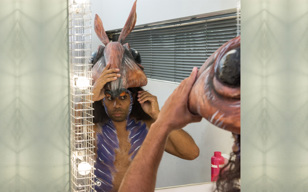Published: 21 February 2020
Great literature offers us many insights into metaphysical questions. American novelist Ursula K. Le Guin uses the theme of paradise to explore questions of morality in her short allegorical tale.
The Ones Who Walk Away from Omelas published in 19731. In this article I’ve annotated the fable with contemporary media fragments to reflect on the relevance of her tale today.
Every week my friend and I buy a lotto ticket, we’re not extravagant or stupid, we understand the odds are against us and yet the momentary exchange offers us a respite, an opportunity to dream of personal paradises. For her, it’s a private jet to New York to set up an animal refuge. For me, it’s building a garden overlooking water to be sustainable.
I use this seemingly banal exercise often when I facilitate leadership workshops and the responses and discussions are surprising similar – buy a house, pay off the mortgage, look after the family, travel. Occasionally though someone moves beyond their own orbit and offers a more selfless suggestion – an offering like my friend who wants to set up an animal refuge. These discussions inevitably lead to more existential conversations about the ‘good life’, and the deeper philosophical questions of egalitarianism and morality.
In the work The Ones Who Walk Away from Omelas, Omelas is a utopian city. The people are normal – they’re not ‘simple folk’ neither are they ‘barbarians’. The narrator assures us that they’re “mature, intelligent, passionate adults whose lives were not wretched” encouraging us to identify with them as people just like ourselves. However, they’re different in a unique way. The people of Omelas live lives free from the emotion of guilt2, creating a kind of paradise. Guilt as a concept, a state of being, a behaviour simply doesn’t exist, echoing the state of bliss that existed in the original garden of paradise, Eden.
We initially meet the townspeople as they celebrate their annual festival. “With a clamor of bells that set the swallows soaring, the Festival of Summer came to the city Omelas, bright-towered by the sea.” The experience is described as: “Joyous! How is one to tell about joy? How describe the citizens of Omelas?”
Remember the distinguishing feature of this city is that guilt is non-existent. If you’re beginning to sense that all isn’t as it seems in Omelas, trust your instincts, for the narrator soon reveals the exorbitantly high price paid to live in this city of bliss. It is revealed that the prosperity and joy of the city of Omelas is contingent on the perpetual misery of one child. All Omelas citizens are aware of this terrifying trade off, with children inducted into the horror at around age seven or eight when they “can understand”3.
The situation is abject, a child living in a squalid basement alone, one child suffering so that the rest of the population can live in joy. Many Omelas people are deeply affected by the child’s existence yet ultimately, to live with joy and without guilt means the child must be sacrificed – promoting utilitarian values. Almost all agree to live silently alongside the horror.
“They all know it is there, all the people of Omelas. Some of them have come to see it, others are content merely to know it is there. They all know that it has to be there. Some of them understand why, and some do not, but they all understand that their happiness, the beauty of their city, the tenderness of their friendships, the health of their children, the wisdom of their scholars, the skill of their makers, even the abundance of their harvest and the kindly weathers of their skies, depend wholly on this child’s abominable misery.”
Le Guin’s catalysing question demands that we as readers consider our own paradoxes between paradise (or comfort) and the consequences – exploitation, environmental destruction, inequality, poverty. She asks who is the child in our basement?
But while there’s despair in Le Guin’s story there’s also hope. Some Omelas citizens refuse to witness or take part in the horror and walk away. Leaving the city and embarking alone with their moral code as guide.
“Each one goes alone, youth or girl man or woman. Night falls...they go on. They leave Omelas, they walk ahead into the darkness, and they do not come back...But they seem to know where they are going, the ones who walk away from Omelas.”
Unquestionably, The Ones Who Walk Away from Omelas is a fable for now urging us to reassess the injustices that sneak unguarded into our morality, that create an inner numbing that tolerates deafness, silence, looking away, living alongside other’s misery without feeling guilt or a need to take action4.
In hindsight the lotto dreaming game mightn’t be as banal as first thought. For when desires are more than solipsistic (gardening and looking after animals), they can contribute to more than self-indulgence, literally and metaphorically. Co-opting French philosopher Voltaire’s belief that gardening – any act of compassion – and enlightened social reform are part of the same project. The project for Paradise according to Voltaire is an aligned inner aliveness where we use our intelligence to promote egalitarianism. Here Paradise is an ethical project.
Incidentally, I’ve decided I don’t need to wait to win the lotto to create my paradise and my grandkids and I have started building a garden. We’ve planted tomatoes, capsicums, some salvia and a passionfruit vine. Together we’re tending, tilling and growing, buoyed by Voltaire’s philosophy that to cultivate one’s garden is to make this world, right here and now, a little better.
1When Ursula K. Le Guin died in January 2018, The New Yorker quoted something she said when accepting the Medal for Distinguished Contribution to American Letters in 2014 – “Resistance and change often begin in art.”
2Dutch journalist Joris Luyendijk, who has thoroughly analysed the world of bankers in London, argues that bankers can behave amorally because they only check whether their behaviour is permitted by law. Yet they definitely do violate the moral basis of law.
In a 2016 piece in The Guardian, he said, “banking staff working in risk and compliance, the legal department and internal audit told me the question is always: how can we game the system within the rules?”
3A family of Tamil asylum seekers from Biloela, Queensland have been held on Christmas Island since August 2019 after a court ordered an injunction against the government removing them from Australia back to Sri Lanka.
Priya, her husband, Nadesalingam, and their Australian born children, Kopika, 4, and Tharunicaa, 2, are awaiting a court decision about whether the government has properly considered whether the youngest child, Tharunicaa, is owed protection. The rest of the family has had their claims rejected. The Guardian, Josh Taylor 27 November 2019.
4Cardiff University’s Steve Westlake investigates the role of leading by example to change social norms in relation to the environment. In a piece in The Conversation in April 2019 focused on the climate emergency he reflected on the debate about personal versus collective action. “...This is a false dichotomy: individual action is part of the collective. So, while you won’t save the world on your own, you might be part of the solution.”

Professor Judith McLean
Professor Judith McLean is the Chair in Arts Education, a joint appointment between Queensland University of Technology (QUT) and the Queensland Performing Arts Centre (QPAC) where she held the role of Scholar in Residence until September 2021. Judith’s career is distinguished by her breadth and diversity of experience as an arts educator, artist and cultural leader across Australia. She is a member of the Australia Council’s Major Performing Arts Panel and Chair of Dancenorth, a contemporary dance company based in Townsville.
You May Also Like

Behind the Scenes
Our Behind the Scenes series takes you on an exclusive journey into the heart of QPAC, where the magic of the stage comes to life.

Projects and Events
QPAC is a creative hub where communities come together to celebrate, learn, and grow through the transformative power of the arts.

Digital Stage
On-demand performances, live streams and behind-the-scenes.

Support
Support QPAC to help nurture and celebrate Queensland's rich artistic heritage while fostering innovation and creativity for the future.


